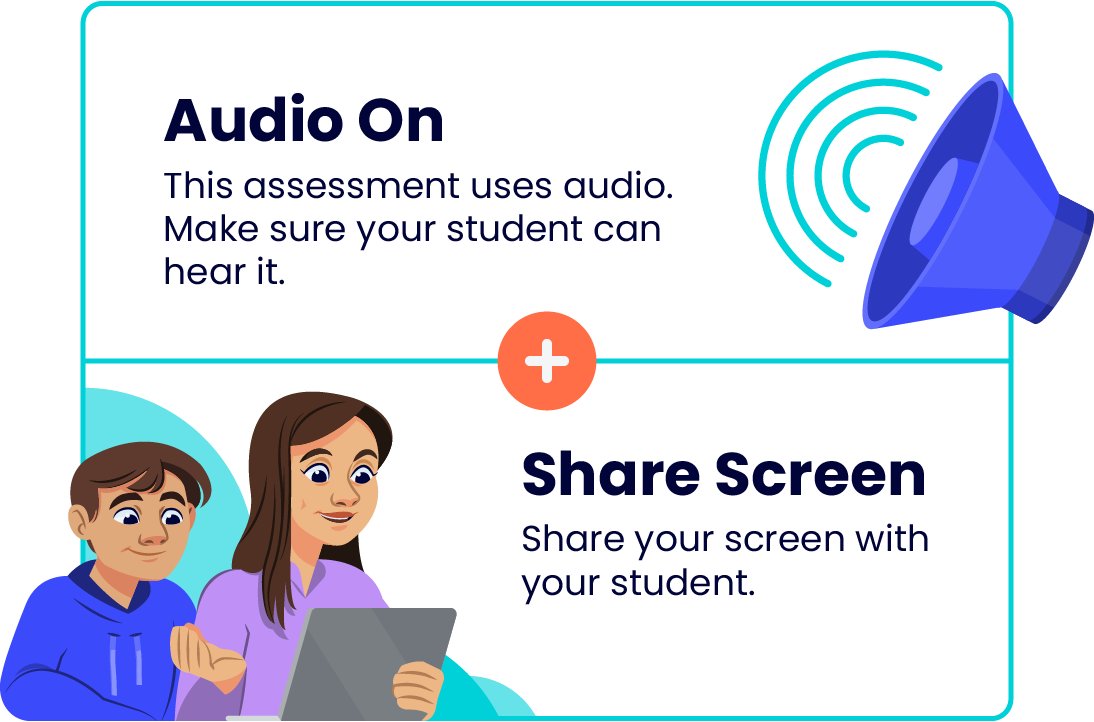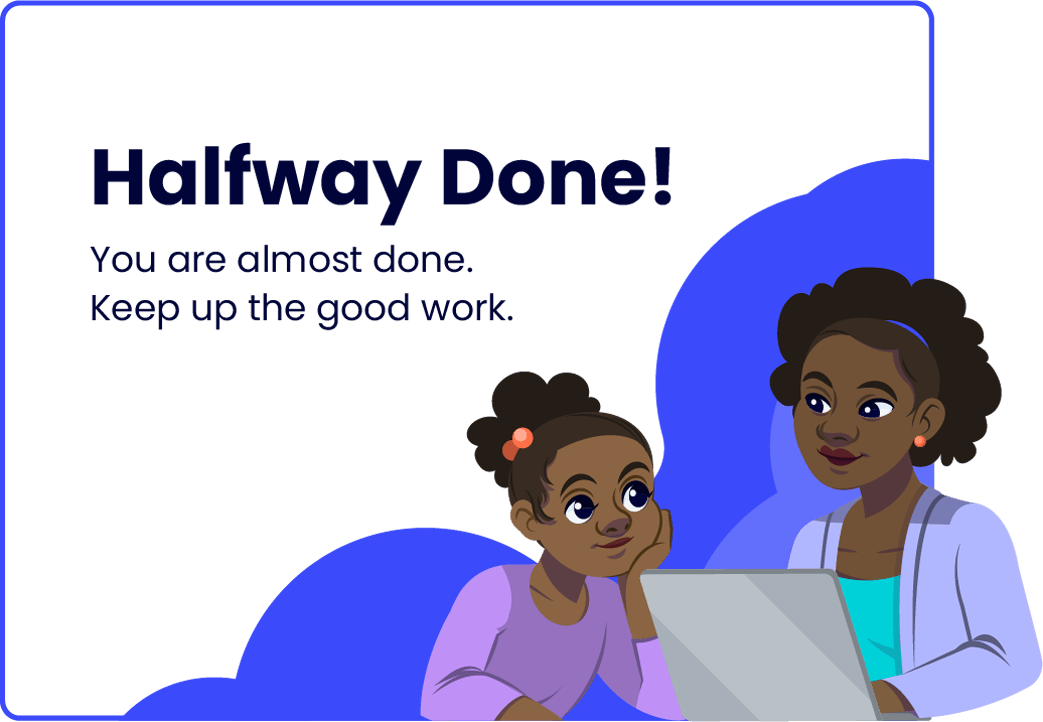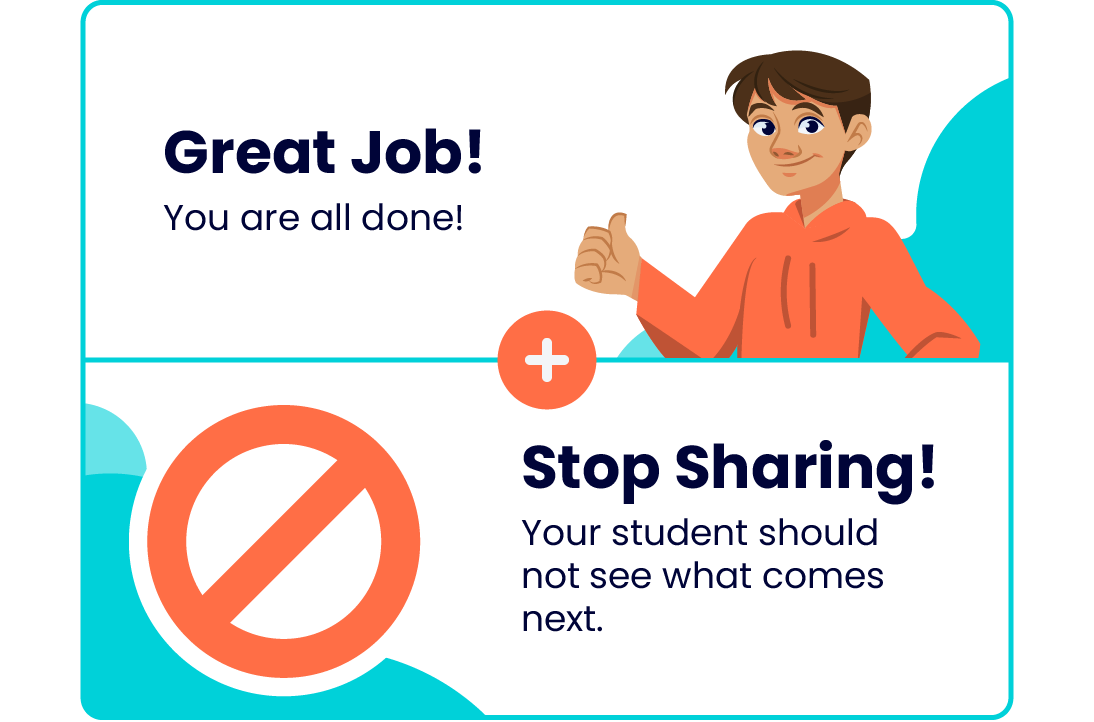Free Dyslexia Test for Kids
Over 300,000 parents have tested their children for dyslexia with Lexercise’s free dyslexia screener. If your child is with you, we strongly recommend our screener (takes 5-10 minutes). If your child is not with you, please try our symptoms quiz.
Does My Child Have Dyslexia? What are the Signs of Dyslexia in Children?
Finding out your child may have a learning disability can be scary, but it’s better to know now when there’s so much you can do about it.
Lexercise offers two free options for screening for signs of dyslexia. Our dyslexia test for kids assesses the fundamentals of a child’s reading skills rather than focusing on their symptoms, making it a more accurate assessment for children of all ages. However, the quick symptoms quiz can serve as a reference guide for parents—especially when your child is not with you to take the complete dyslexia test. Scroll down to learn more about these two options or, if you are ready to get started, click on the at-home dyslexia test that best fits your family below.

Screening for Signs of Dyslexia
If you have your child with you, our dyslexia screener is your best option.
Using the science-backed Grade-Level Reading Assessment or (also known as San Diego Quick Assessment or SDQA) and our Dyslexia Z-ScreenerTM, our dyslexia test for kids is a proven way to assess the likeliness of a child’s dyslexia risks. Watch this video to learn more about our online screener and how our dyslexia test works. When you are ready, click on this link to get started!
Are you an adult looking to take our dyslexia screener?
The Lexercise Dyslexia ScreenerTM is for children and adults. However, it is only effective when someone else administers the screener to you, as opposed to you doing it yourself. We don’t recommend self-administering the screener.
Are you a teacher looking to screen a student?
We recommend you create a teacher account to access our suite of student testing. It’s easy, convenient, and free.
Get Started with a Reading Program That Actually Works!
-
Take the 5-10 minute dyslexia test with your child.
-
Learn the risk of dyslexia immediately upon completion.
-
Identify an effective dyslexia treatment plan.
Take our Dyslexia Symptoms Quiz
If you’re not sure whether or not the screener above is necessary, or if you don’t have your child with you, our Dyslexia Symptoms Quiz is a great place to start. This quick quiz outlines the primary signs of dyslexia in children. Carefully read each of the signs of dyslexia below, and answer by clicking ‘yes’ on any applicable questions. When completing this assessment, it is helpful to consider your child’s performance in relation to other children in their reading and writing grade levels.

Let Us Help!
Concerned about your child’s test results or other potential learning disabilities? Our highly-trained literacy experts are ready to help via our Reading & Spelling Assessment. This is what you get when you sign up for this service:
-
Access our science-backed suite of literacy assessments, customized to your child’s specific needs.
-
Meet with one of our expert therapists, from the comfort of your own home, for a 45-minute, online consultation.
-
Receive a detailed 8-10 page report for your records, along with a guide on next steps and resources that can benefit your struggling reader, writer, or speller.
All of this and more for a flat fee of $195
Frequently Asked Questions
At what age should you test for dyslexia?
We recommend using the free Lexercise Dyslexia Screener if your child is 5 years old or older and has had formal reading instruction for at least 6 months. If a child who has been taught reading for at least 6 months does not pass the Lexercise Dyslexia Screener, this suggests the possibility of language processing problems.
If your child has not attended school yet and has not had formal reading instruction for at least 6 months, we don’t recommend using the Lexercise Dyslexia Screener since it looks at skills your child likely does not yet have.
However, the kind of problems that cause dyslexia CAN be identified in a preschooler or young student, and if you can identify them and get help early you can often prevent a lot of difficulties and save thousands of dollars. For those students, a full language processing evaluation is an option. This evaluation involves a combination of standardized and descriptive measures given by a qualified professional and usually takes one to two hours. You can also consult with a literacy expert to learn more about your options. Fill out our contact form and one of our educational partners will contact you to set up a free call.
How accurate are dyslexia screeners?
The accuracy of a dyslexia screener is typically measured in two ways:
- How accurately the screener identifies people as AT RISK who DO have dyslexia (sensitivity)
- How accurately the screener identifies people as NOT AT RISK who DO NOT have dyslexia (specificity)
No screener is 100% accurate. The National Center on Improving Literacy suggests that a good screener will correctly identify students 70% to 80% of the time.
Screeners are not diagnostic or descriptive tools. Dyslexia screeners are designed to identify which students need more attention, such as an in-depth reading and spelling inventory to describe the student’s strengths and weaknesses and/or the use of a science-backed intervention. If you are concerned about your student’s reading development, using the free Lexercise Dyslexia ScreenerTM is a great place to start. The science of reading supports getting help as early as possible, before a child gets too far behind and experiences too much emotional struggle. A follow-up call with one of our highly-trained dyslexia therapists can help confirm whether or not your child requires additional assessment and/or therapy.
What makes the Lexercise dyslexia screener different?
The Lexercise Dyslexia Screener stands out for a couple of key reasons. Firstly, it’s accessible to parents online and for free, a feature not common in most screeners. Additionally, it offers parents a swift and efficient means to seek assistance for their child, breaking free from the conventional wait-and-fail cycle.
The Lexercise dyslexia test is more efficient in identifying the risk of dyslexia because it combines two separate assessments to pinpoint a child’s ability to read words. One of them is the Grade-Level Word Reading Assessment (also known as the San Diego Quick Assessment or SDQA), the other is our proprietary, Dyslexia Z-ScreenerTM.
What is the Grade-Level Word Reading Assessment?
The Grade-Level Word Reading Assessment (also known as the San Diego Quick Assessment or SDQA) is a list of words categorized by grade level that is used to determine reading level and detect errors in word analysis, indicating how well the child is reading words at each grade level.
Research has confirmed that the Grade-Level Word Reading Assessment provides a fairly accurate estimate of a child’s ability to read grade-level material and that is good for its intended purpose: as a first-step screening procedure.
Poor readers have been shown to be over-dependent on context cues when reading text. In this assessment the child is presented with single words that were not in a sentence or in any other meaningful context (like next to a picture), making it a more accurate gauge of their word-reading ability.
There are many factors that contribute to how well a child comprehends and applies what he or she reads. While no single test can adequately capture that whole, complex picture, the combination of the Grade-Level Word Reading Assessment (SDQA) and the Dyslexia Z-ScreenerTM has proven to be useful for identifying students who are at risk.
What is the Dyslexia Z-ScreenerTM?
The Lexercise Dyslexia Z-ScreenerTM is an online test of a student’s ability to decode simple but unfamiliar words. The Common Core State Standards (CCSS) include decoding regularly spelled, single-syllable words with short vowel sounds under Foundational Skills at a Kindergarten level.
The Dyslexia Z-ScreenerTM uses nonsense words in order to provide an assessment of how well a student is able to sound out novel words that they have not memorized. Students with decoding difficulties like dyslexia may have memorized many common words but have persistent difficulty decoding unfamiliar words, especially those with so-called short vowels. The Dyslexia Z-ScreenerTM was developed to specifically address this pattern.
Using words that start with -z- puts the focus on pronouncing the vowel sound and the following consonant or consonants, which is known to be particularly difficult for students who have processing difficulties like dyslexia. The simple nonsense words in this assessment increase the complexity in 9 bands labeled A through I. The assessment automatically stops when the student makes 5 errors in a band because it is unlikely the student will have success in the higher complex bands.
Thus, the Dyslexia Z-ScreenerTM can be useful in describing the decoding patterns common in dyslexia but missed in reading assessments that use only real words that bright dyslexic students may have memorized as whole units.
There are many factors that contribute to how well a child comprehends and applies what he or she reads. While no single test can adequately capture that whole, complex picture, the Grade-Level Word Reading Assessment (SDQA) in combination with the Dyslexia Z-ScreenerTM has proven to be a quick and reliable way to identify students who are struggling with reading words.
More Services for Dyslexia and Learning Difficulties
Free Testing for Learning Disabilities
If you are looking for additional screeners for your child, we offer free testing for dysgraphia, emotional and behavioral testing, listening comprehension, and many more.
Language Literacy Evaluation
If you are looking for a more comprehensive evaluation, our Language Literacy Evaluation can provide you with an expert diagnosis for your child’s reading, writing, or spelling problems.








